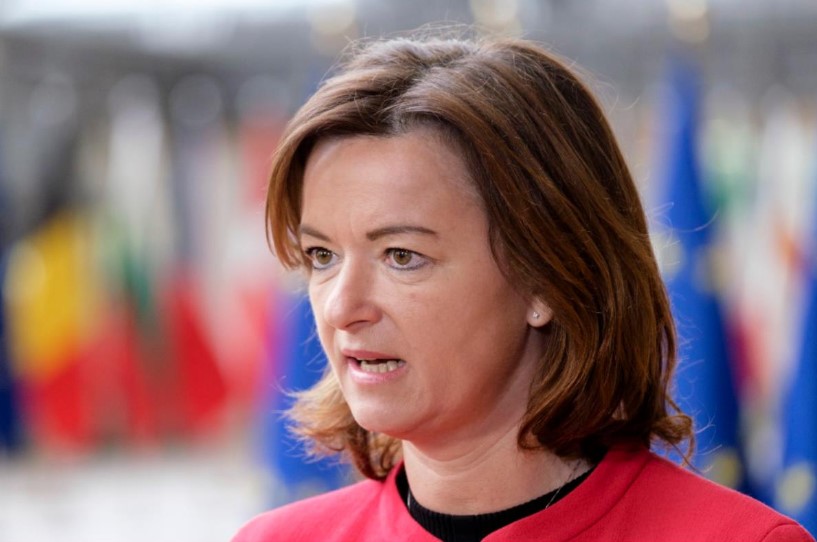By: Gašper Blažič
Minister for Foreign and European Affairs Tanja Fajon is pleased that the European Commission is not halting aid to the Palestinians after this was initially announced by European Commissioner Oliver Varhelyi on Monday. Before today’s informal meeting of EU foreign ministers, where she expects a tense discussion, she advocated for a “two-state solution”. Whatever that may mean.
As reported by STA, the minister expects a tense discussion at today’s informal meeting of EU foreign ministers, particularly after the reportedly “ill-advised” announcement by European Commissioner for Neighbourhood Varhelyi that the EU is suspending development aid to the Palestinians following an attack by the Palestinian Islamist movement Hamas on Israel. “I am pleased that the Commission revoked this by the end of the day because we must not harm the civilian population,” said Foreign Minister Tanja Fajon, who has also established contact with Commissioner for Crisis Management Janez Lenarčič’s office regarding this. It is known that Lenarčič also supports the continuation of funding for Palestine. In Brussels, it has been clarified today that Varhelyi did not consult with other members of the Commission before his announcement on the social media platform X. They assured that the EU is not suspending either development or humanitarian aid but will, as they say, “review development aid”.
Hamas deleted and then put back on the list of terrorist organisations
Well, the fact is that Fajon is again faking ignorance here, but she is not alone in this, as the indecisive EU has taken a step back, apparently under the influence of the European left, which is strongly supportive of the Palestinians and Hamas. It is worth remembering that the Slovenian government party, Levica, openly supported Hamas. As it is known, the EU designated Hamas as a terrorist organisation 22 years ago, and in 2014, the European Court annulled that decision, arguing that it was based on media and internet reports, not on a considered legal assessment. Well, this argument strongly resembles the behaviour of some “supervisory” left-wing portals, such as Oštro, for example.
A little later, the EU court did correct its decision, and since then, Hamas has remained on the list of terrorist organisations. This also binds the European Commission, as it means that Hamas is subject to strict EU sanctions. The political wing of Hamas has a strong influence on the overall policy of the Palestinian state, and the main stronghold of Hamas is in Gaza, where Hamas uses local civilians as human shields. Israeli retaliatory measures, which are a common occurrence in the region, often lead to casualties, especially among civilians, as was the case today. Even the financial resources that the EU provides to Palestinians for humanitarian and development purposes must be under strict control, as there is a possibility that they could also fund terrorism through these channels.
Lesson from France Bučar in 1988
These are the facts that the EU should consider in its approach to Palestine and the Israeli-Palestinian peace process. Some lessons can also be drawn from the former peace process in Northern Ireland, where the signing of the Good Friday Agreement in 1998 marked the end of bloodshed, and the formally Catholic but essentially leftist guerrilla Irish Republican Army disarmed. The biggest obstacle to peace in the Middle East is the operation of terrorist organisations, which then trigger retaliatory military actions by Israel and result in civilian casualties. Negotiations between Palestine and Israel will not be possible due to the bloody events of October 7th until the Palestinians themselves stop Hamas, which at least one of the Slovenian government parties openly supports. EU’s policy of divided language will only prolong the agony of the Middle East peace process.
The same applies, of course, to funding. Let’s recall: in 1988, the “Nova Revija supporter” and forcibly retired professor of law, France Bučar, who later became the president of the first democratic assembly, reminded us in his legendary speech in Strasbourg that financial aid to totalitarian Yugoslavia and its regime only prolongs the agony of the totalitarian state. However, Western countries were almost inclined to extend the life of Yugoslavia with a new financial package, just before Slovenia’s declaration of independence in 1991. Well, after the YPA’s attack on independent Slovenia, Austrian (Social Democratic) Chancellor Franz Vranitzky, albeit diplomatically, pointed out the need for international measures against Yugoslavia and that financial aid was not appropriate.

